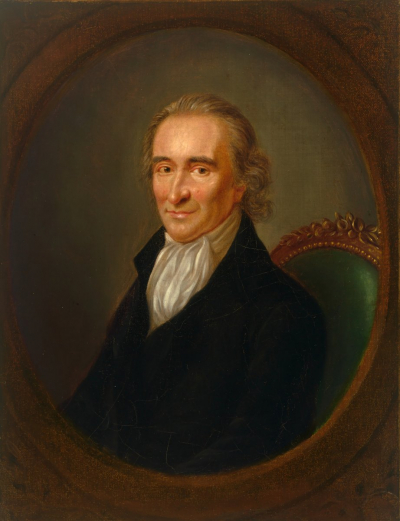In the United States, abolitionism, the movement that sought to end slavery in the country, was active from the late colonial era until the American Civil War, the end of which brought about the abolition of American slavery through the Thirteenth Amendment to the United States Constitution (ratified 1865).
The anti-slavery movement originated during the Age of Enlightenment, focused on ending the trans-Atlantic slave trade. In Colonial America, a few German Quakers issued the 1688 Germantown Quaker Petition Against Slavery, which marks the beginning of the American abolitionist movement. Before the Revolutionary War, evangelical colonists were the primary advocates for the opposition to slavery and the slave trade, doing so on humanitarian grounds. James Oglethorpe, the founder of the colony of Georgia, originally tried to prohibit slavery upon its founding, a decision that was eventually reversed.
During the Revolutionary era, all states abolished the international slave trade, but South Carolina reversed its decision. Between the Revolutionary War and 1804, laws, constitutions, or court decisions in each of the Northern states provided for the gradual or immediate abolition of slavery. No Southern state adopted similar policies. In 1807, acting as soon as the Constitution allowed, Congress made the importation of slaves a crime. Immediate emancipation became a war goal for the Union in 1862 and was fully achieved in 1865.
Thomas Paine (born Thomas Pain; February 9, 1737 [O.S. January 29, 1736] – June 8, 1809) was an English-born American political activist, philosopher, political theorist, and revolutionary. He authored Common Sense (1776) and The American Crisis (1776–1783), two of the most influential pamphlets at the start of the American Revolution, and helped inspire the patriots in 1776 to declare independence from Great Britain. His ideas reflected Enlightenment-era ideals of transnational human rights.Born in Thetford, Norfolk, Paine emigrated to the British American colonies in 1774 with the help of Benjamin Franklin, arriving just in time to participate in the American Revolution. Virtually every rebel read (or listened to a reading of) his 47-page pamphlet Common Sense, proportionally the all-time best-selling American title, which catalysed the rebellious demand for independence from Great Britain. The American Crisis was a pro-revolutionary pamphlet series. Paine lived in France for most of the 1790s, becoming deeply involved in the French Revolution. He wrote Rights of Man (1791), in part a defense of the French Revolution against its critics. His attacks on Anglo-Irish conservative writer Edmund Burke led to a trial and conviction in absentia in England in 1792 for the crime of seditious libel.
The British government of William Pitt the Younger, worried by the possibility that the French Revolution might spread to Britain, had begun suppressing works that espoused radical philosophies. Paine's work, which advocated the right of the people to overthrow their government, was duly targeted, with a writ for his arrest issued in early 1792. Paine fled to France in September where, despite not being able to speak French, he was quickly elected to the French National Convention. The Girondins regarded him as an ally; consequently, the Montagnards, especially Maximilien Robespierre, regarded him as an enemy.
In December 1793, he was arrested and was taken to Luxembourg Prison in Paris. While in prison, he continued to work on The Age of Reason (1793–1794). James Monroe, a future President of the United States, used his diplomatic connections to get Paine released in November 1794. Paine became notorious because of his pamphlets and attacks on his former allies, who he felt had betrayed him. In The Age of Reason and other writings he advocated Deism, promoted reason and freethought, and argued against institutionalized religions in general and the Christian doctrine in particular. In 1796, he published a bitter open letter to George Washington, whom he denounced as an incompetent general and a hypocrite. He published the pamphlet Agrarian Justice (1797), discussing the origins of property and introduced the concept of a guaranteed minimum income through a one-time inheritance tax on landowners. In 1802, he returned to the U.S. When he died on June 8, 1809, only six people attended his funeral, as he had been ostracized for his ridicule of Christianity and attacks on the nation's leaders.

1775Mar, 8
An anonymous writer, thought by some to be Thomas Paine, publishes "African Slavery in America", the first article in the American colonies calling for the emancipation of slaves and the abolition of slavery.
Choose Another Date
Events on 1775
- 8Mar
Abolitionism in the United States
An anonymous writer, thought by some to be Thomas Paine, publishes "African Slavery in America", the first article in the American colonies calling for the emancipation of slaves and the abolition of slavery. - 18Apr
Battles of Lexington and Concord
American Revolution: The British advancement by sea begins; Paul Revere and other riders warn the countryside of the troop movements. - 19Apr
Battles of Lexington and Concord
American Revolutionary War: The war begins with an American victory in Concord during the battles of Lexington and Concord. - 17Jun
Battle of Bunker Hill
American Revolutionary War: Colonists inflict heavy casualties on British forces while losing the Battle of Bunker Hill. - 3Jul
George Washington
American Revolutionary War: George Washington takes command of the Continental Army at Cambridge, Massachusetts.

 English
English  español
español  français
français  português
português  русский
русский  العربية
العربية  简体中文
简体中文 